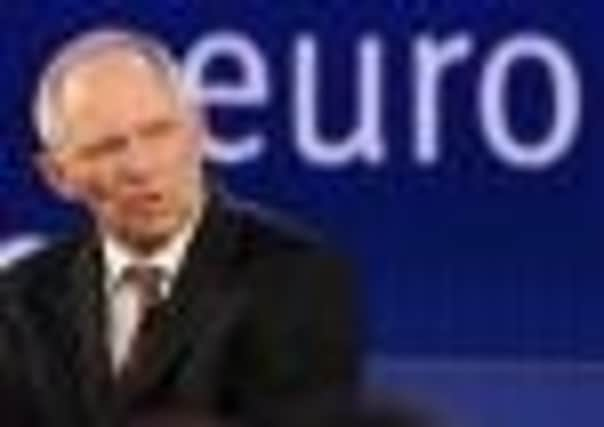Duncan Hamilton: Centralisation as a response to euro crisis would leave us all the poorer


What caught my eye was his use of the occasion to call for a directly elected president in the European Union. The move, allied to a call for greater power for EU institutions, comes in response to criticism that the absence of political unity is adding to the debt crisis. The argument for an elected EU president is not new, but what is startling is that it should be revived at this time. With the greatest of respect to a man admired by many, it points to a total failure to comprehend what has happened to the aspiration of political and economic union in Europe.
It may well be true that the political discord of recent times has exacerbated the debt crisis. I understand entirely why those in the heart of the crisis, such as Schaeuble, must pull their hair out at the failure of national governments to approach this crisis in accordance with German wishes. But to address that problem by attempting to assert a pan-European government structure – which is all about drawing power towards the existing EU institutions at the centre and away from those troublesome underperforming peripheral Eurozone members – is to entirely misunderstand the moment.
Advertisement
Hide AdAdvertisement
Hide AdDo people around Europe want greater democracy? Yes, but not as a means of empowering greater imposition of EU will on member states. Democracy is what has delivered change in France. It is what looks likely to deliver potentially seismic change in Greece. That’s messy, it’s uncomfortable and it poses all sorts of problems for central policy-makers trying to keep the euro show on the yellow brick road. But whatever else recent events tell us, on no possible interpretation can it be said that the citizens of the EU are marching for less national sovereignty and even more distant, top-down imposition of policy. Unity of action may be central to the European dream but so too is subsidiarity, local accountability and the celebration of diverse opinion. Schaeuble may see that as a luxury which the EU cannot currently afford. I disagree – the tide is now flowing the way of the nation state.
Let’s be clear, no-one is suggesting that the EU, let alone the euro, can function without unity of purpose. Globalisation demands that anyway, and membership of the EU must come with a shared sense of broad direction. That isn’t in dispute. Where people are increasingly at odds is whether the vision for the future is a looser association of nation states sharing sovereignty and acting in common purpose or more of the relentless drive to central control.
Remember, if you will, that the thirst for greater EU centralisation (whether with the veneer of democracy via a directly elected president or not) comes against a backdrop of both Italy and Greece having technocratic governments imposed and democracy suspended. Desperate times called for desperate measures, we were told, but the very fact that such a position could be so readily imposed should have alarm bells ringing. The EU is there to serve the interests of its citizens, not the other way around. When the EU starts to view individual nations as fodder for a “grand plan” something has gone very much amiss.
And that’s the real point that those who want to sell the concept of Europe need to grasp. If you want normal, reasonable people to embrace the concept of Europe then it needs to stop being threatening. It needs to be a natural home for like-minded nations, not a boot camp for financial austerity.
I wholly embrace the concept of being European. I positively like the notion of shared sovereignty. I happily champion globalisation and cannot imagine a national identity that was not also necessarily internationalist. But this debate is now about how we view the next 50 years. It is about the terms of engagement between nations.
The real lesson of the last years has been about the prevailing vitality of national and regional identity. The clever move for the pro-European movement is about finding a model of governance – with or without a single currency – which adequately reflects the shared history and ambition of European nations without being seen to ride roughshod over national sovereignty and the will of individuals. The 21st century is all about the individual – the EU either exists as a voluntary collective arrangement to empower its citizens or it has lost its way entirely.
More central control at a time when people across the EU are clearly asserting their divergent preferences might calm the markets, but at what cost? «